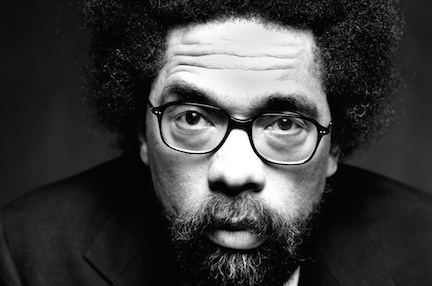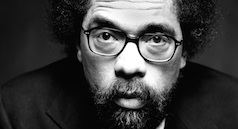
“None of us alone can save the nation or the world.
But each of us can make a positive difference
if we commit ourselves to do so.”
— Cornel West
(ΦBK, University of Tulsa, 1992)
By Nicholas McCarty
American philosopher and activist Cornel West has dedicated his life to education and the advancement of social causes. In his 2009 memoir Brother West: Living and Loving Out Loud, he describes the three ideologies that guide his endeavors: family, Socratic spirituality in pursuit of truth, and a Christian commitment to the principles of love and justice. Born in Tulsa, Oklahoma, but raised in Sacramento, California, West attended John F. Kennedy High School and graduated at the top of his class. Throughout his youth, he was inspired by Malcolm X and James H. Cone, the American theologian best known for his advocacy of Christianity as a means to help African-Americans overcome oppression. Over the last four decades, West has demonstrated the depth of his convictions through his tireless defense of civil rights and advocacy for social reform.
West graduated from Harvard College magna cum laude in three years with a degree in Near Eastern Languages and Civilization. He then attended Princeton University, earning an MA and PhD in philosophy.
West has been both an educator and a civil rights proponent throughout his professional career. Over the last 30 years, he has mentored hundreds of students and has received more than 20 honorary degrees. He has taught at Princeton, Harvard, Yale, and the Union Theological Seminary in New York City. West is also the author and editor of more than 30 books, including the critically acclaimed Race Matters, which won a 1993 American Book Award. The scope of West’s influence extends beyond academic circles, however. He has appeared in more than 25 documentaries and films and has made three spoken word albums. Never Forget: A Journey of Revelations (2007) features West’s collaborations with Prince, Outkast, and Talib Kweli. In 1992, the Phi Beta Kappa chapter at the University of Tulsa made West an honorary member of the Society, fitting recognition for his remarkable scholarly work and his ongoing contribution to the public intellectual life of the country.
As a scholar, author, and philosopher, West’s views are perhaps best described in a 1990 PBS interview with Bill Moyers, in which West states:
“…the quest for truth, the quest for the good, the quest for the beautiful…presupposes allowing suffering to speak, allowing victims to be visible, and allowing social misery to be put on the agenda of those with power. And so my own sense of pursuing the life of the mind is inextricably linked with struggle for those who have been dehumanized and for those who have been marginalized.”
Indeed, West has been a powerful and pragmatic advocate for a multitude of social issues. He has fought against race and class inequality, war, and corporate greed, and he has led protests against South Africa’s apartheid regime, police brutality in Ferguson, Missouri, and against the NYPD stop and frisk policy. His commitment to the promotion of equality ultimately highlights his remarkable ability to alter the social landscape through both physical and literary means.
Today, West spends the majority of his free time traveling and giving guest lectures. In an interview with The New York Times, West describes himself as “a bluesman in the life of the mind, a jazzman in the world of ideas, forever on the move.” Currently a professor of philosophy and Christian practice at Union Theological Seminary, West’s recent courses include Gandhi and King, Radical Love, and The Historical Philosophy of W.E.B. Du Bois.
By speaking for those without a voice in American society, Cornel West embodies the mindset of a nation with a rapidly evolving social and racial landscape. His literary and scholarly work has made powerful strides in alleviating stereotypes and reevaluating social wellbeing; his passionate and purpose-driven work will have profound impacts for generations to come.
Nicholas McCarty is a junior at the University of Iowa majoring in Biochemistry. The University of Iowa is home to the Alpha of Iowa Chapter of Phi Beta Kappa.




